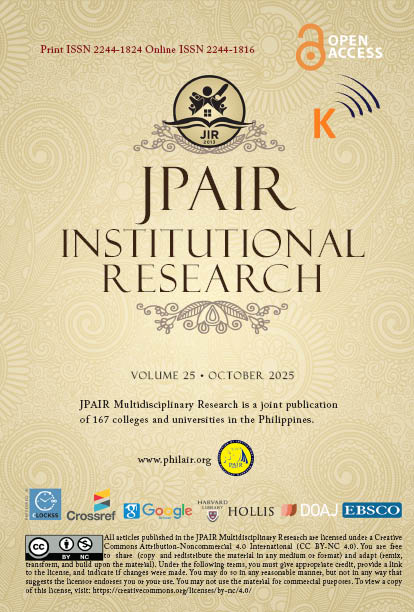Adapting Flexible Learning in Health Education: Practical Skills Development, Engagement Strategies, and Mental Health Challenges
DOI:
https://doi.org/10.7719/irj.v25i1.967Keywords:
Education flexible learning, blended learning, health education, student perspectives, teacher perspectives, education resilience, qualitative descriptive, PhilippinesDisciplines:
Allied Health Education, Health Professions EducationAbstract
This study explores the perspectives of Allied Health students and faculty at the University of Baguio on adopting flexible learning during the COVID-19 pandemic and the subsequent shift to limited face-to-face classes. With the increasing role of flexible educational models, this study aims to assess the challenges faced by stakeholders, including technology, student engagement, and the acquisition of practical skills. With a qualitative descriptive research design, the study utilized purposive sampling to choose 10 teachers and 10 students who experienced flexible learning during SY 2021-2022 and transitioned to limited face-to-face classes during SY 2022-2023. Thematic analysis revealed the following key themes: technological adaptation, engagement strategies, instructional approaches, and mental health concerns. Teachers employed hands-on supervision, iterative teaching, and additional exercises as strategies to address gaps in practical skill acquisition. Students utilized time management and goal-setting skills to adapt to the blended learning environment. This research highlights the need for an adaptable and robust learning structure that combines online and face-to-face lecture delivery to provide continuity and quality of education, especially in fields that require practical skills. Recommendations include adopting a flexible learning framework that prioritizes experiential learning through simulation and hands-on exercises, investing in staff development to enhance technological competence, and implementing systems to support students' mental well-being. These recommendations and findings aim to inform the university’s strategic planning efforts, enhancing teaching and learning practices to better adapt to future disruptions and improve the quality of education related to health.
References
Adnan, M., & Anwar, K. (2020). Online learning amid the COVID-19 pandemic: Students' perspectives. Online Submission, 2(1), 45-51.
Amin, A. J. A. (2023). Profiling Teachers’ Readiness and Competence for Flexible Learning. International Journal for Multidisciplinary Research. https://doi. org/10.36948/ijfmr, v05i06. https://doi.org/10.36948/ijfmr.2023.v05i06.8773.
Ardito, C. G. (2024). Zero waste: leveraging blended learning materials in traditional teaching. MSOR Connections, 22(3).
Downloads
Published
Issue
Section
License
Copyright (c) 2025 Marilou M. Saong, Rhey Gregory Z. Aquino

This work is licensed under a Creative Commons Attribution-NonCommercial 4.0 International License.
Open Access. This article, published by JPAIR Multidisciplinary Research, is licensed under a Creative Commons Attribution-Noncommercial 4.0 International (CC BY-NC 4.0). You are free to share (copy and redistribute the material in any medium or format) and adapt (remix, transform, and build upon the material). Under the following terms, you must give appropriate credit, provide a link to the license, and indicate if changes were made. You may do so in any reasonable manner, but not in any way that suggests the licensor endorses you or your use. You may not use the material for commercial purposes.












